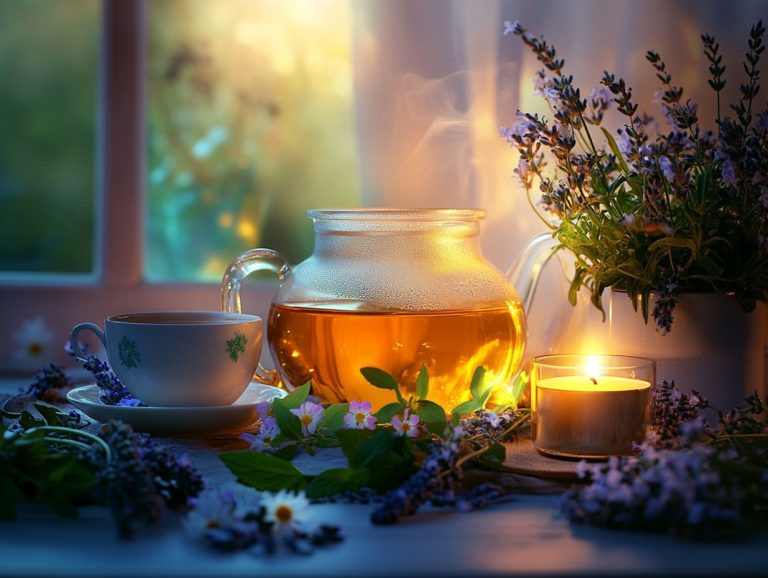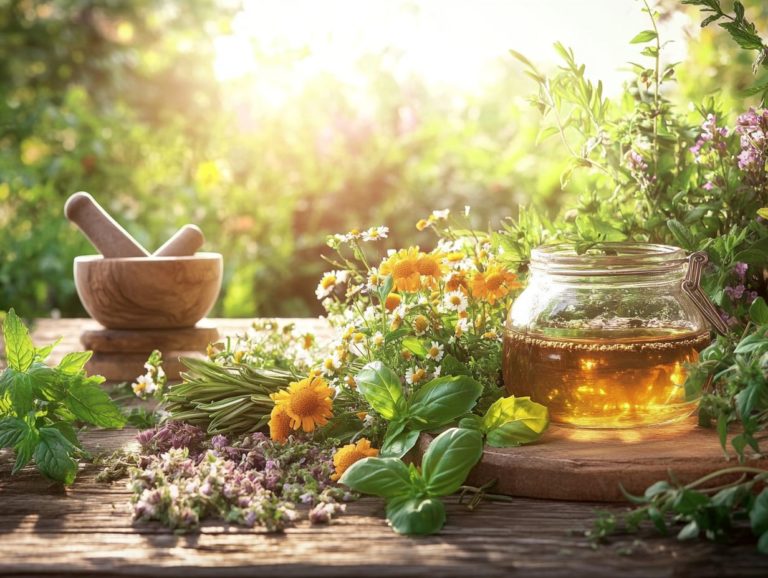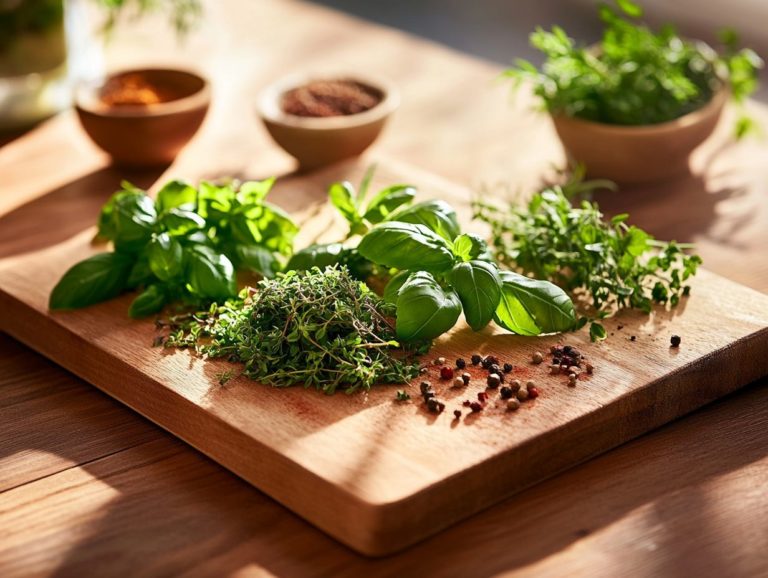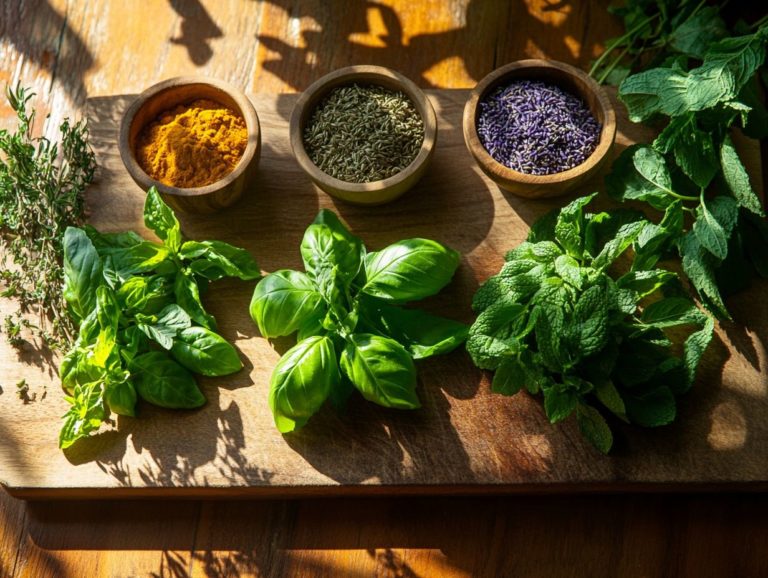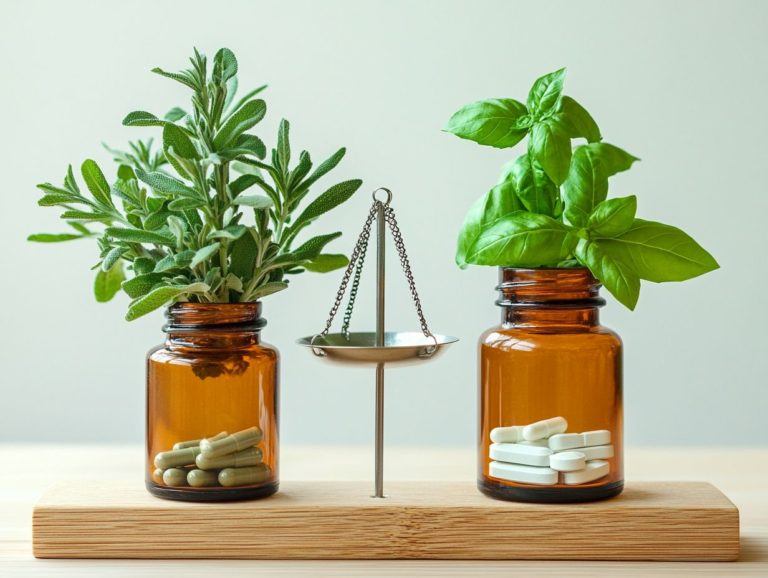5 Herbal Remedies for Seasonal Affective Disorder
As the days grow shorter and the winter chill envelops your surroundings, you may find yourself grappling with Seasonal Affective Disorder (SAD) a type of depression closely linked to the changing seasons.
If the weight of the colder months is pressing down on you, you might wonder how natural solutions could offer some relief.
Get ready to discover five powerful herbal remedies that can lift your spirits this winter: St. John’s Wort, Saffron, Rhodiola Rosea, Ashwagandha, and Valerian Root. These remedies could potentially elevate your mood.
This article will clarify what SAD truly is, outline its symptoms, and present practical ways to weave these remedies into your daily routine.
Explore how these herbs might illuminate your winter days and enhance your overall well-being!
Contents
- Key Takeaways:
- 1. St. John’s Wort
- 2. Saffron
- 3. Rhodiola Rosea
- 4. Ashwagandha
- 5. Valerian Root
- What Is Seasonal Affective Disorder (SAD)?
- What Are the Symptoms of SAD?
- How Can Herbal Remedies Help with SAD?
- What Are the Other Benefits of These Herbal Remedies?
- Are There Any Side Effects of Using Herbal Remedies for SAD?
- How Can One Incorporate These Herbal Remedies into Their Daily Routine?
- What Other Natural Methods Can Help with SAD?
- When Should One Consult a Doctor for SAD?
- Can These Herbal Remedies Be Used in Conjunction with Other Treatments for SAD?
- Frequently Asked Questions
- What is Seasonal Affective Disorder (SAD)?
- What are the causes of Seasonal Affective Disorder?
- What are the 5 herbal remedies for Seasonal Affective Disorder?
- Can herbal remedies be used as the sole treatment for Seasonal Affective Disorder?
- Are there any side effects to using herbal remedies for Seasonal Affective Disorder?
- How long does it take for herbal remedies to show results for Seasonal Affective Disorder?
Key Takeaways:
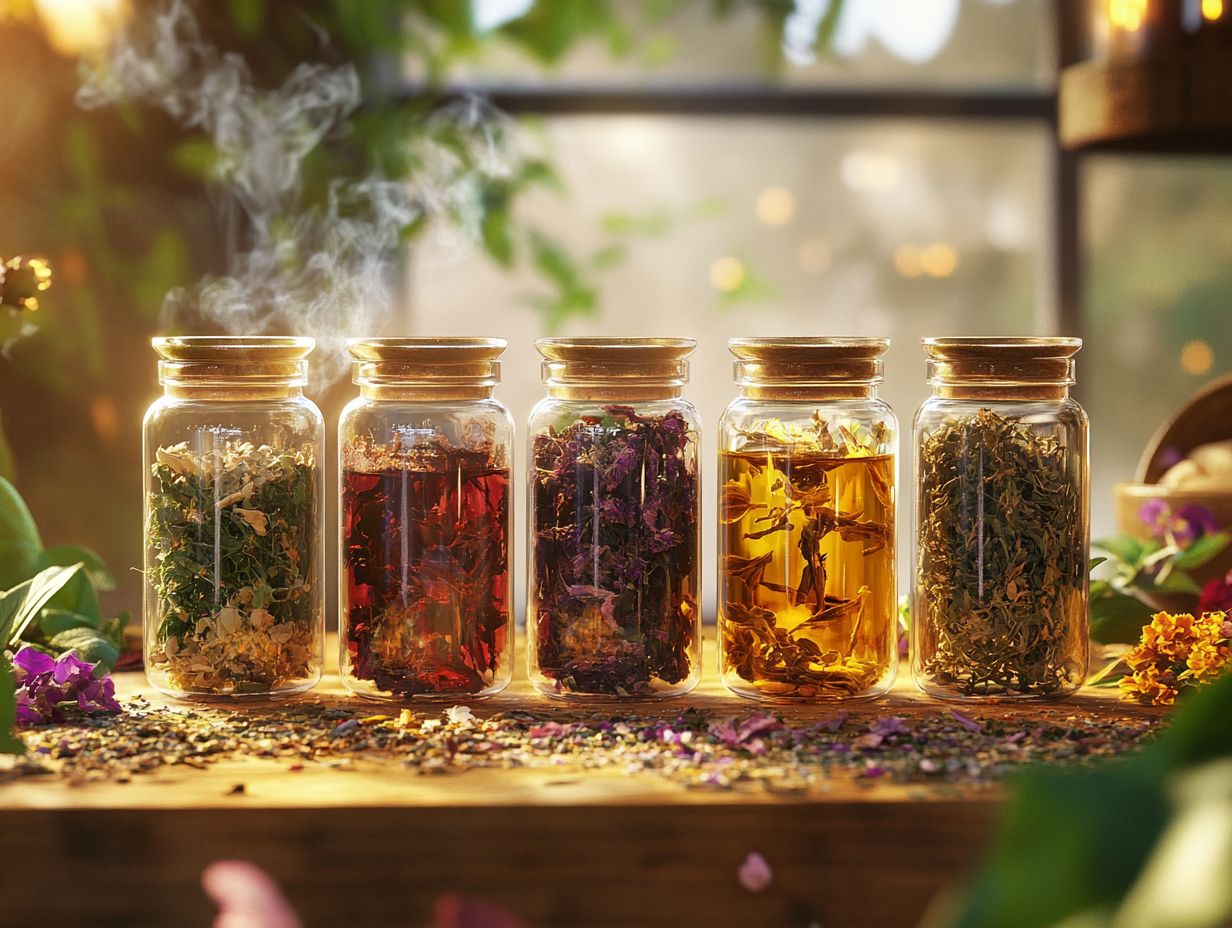
- St. John’s Wort, Saffron, Rhodiola Rosea, Ashwagandha, and Valerian Root can help alleviate symptoms of Seasonal Affective Disorder (SAD).
- These remedies can improve mood, reduce stress and anxiety, and promote better sleep.
- Always consult a doctor before using herbal remedies for SAD.
- Incorporate these remedies into a daily routine along with other natural methods for managing SAD.
1. St. John’s Wort
St. John’s Wort is a well-known herbal remedy that may significantly enhance mental health, particularly for those dealing with Seasonal Affective Disorder (SAD) or mood disorders.
This plant boosts serotonin levels and promotes emotional well-being.
It has a rich history in herbal medicine, dating back to Ancient Greece, where it was used for various ailments, from wounds to nerve pain.
Modern research backs its effectiveness in tackling depression, showing that it can be just as effective as standard antidepressants, often with fewer side effects.
Mental health professionals recognize its therapeutic potential. While it may not suit everyone, many individuals find substantial relief through this natural alternative.
2. Saffron
Saffron, derived from the beautiful flower of Crocus sativus, is a remarkable herbal remedy that can elevate your mood and ease symptoms of Seasonal Affective Disorder (SAD) and clinical depression.
Saffron works because of its active compounds like crocin and safranal, which may positively influence serotonin levels in your brain.
Several clinical studies show that saffron can rival conventional antidepressants in alleviating depressive symptoms while boasting fewer side effects, making it a compelling option for those seeking natural remedies.
Incorporating saffron into your diet is easy; simply add it to rice dishes, soups, or teas. Enjoy its delightful flavor while reaping the mood-boosting benefits it offers.
3. Rhodiola Rosea
Rhodiola Rosea, often called golden root, is a type of herb that helps your body adapt to stress and can elevate your energy levels, making it a valuable ally against Seasonal Affective Disorder (SAD) and similar mood disorders.
This remarkable plant boosts physical stamina and alleviates fatigue, featuring thick, fleshy roots and vibrant yellow-green flowers that thrive in cold, mountainous regions.
For centuries, people have harnessed the power of Rhodiola, linking its benefits to increased vitality and reduced stress after enduring long winters.
Scientific research supports these traditional uses, showing its ability to improve cognitive function and stress response. This can be especially advantageous when paired with cognitive behavioral therapy.
Together, this powerful combination not only promotes emotional well-being but also gives you the power to face challenges with sharper focus and renewed energy.
4. Ashwagandha
Ashwagandha is a valued herb in Ayurvedic medicine, celebrated for its properties that help the body manage stress and enhance mental health. This makes it a compelling remedy for those grappling with Seasonal Affective Disorder (SAD).
Research supports its remarkable ability to modulate stress responses, showing that it can effectively lower cortisol levels and alleviate anxiety symptoms. A study published in the Journal of Clinical Psychiatry revealed that participants who incorporated ashwagandha into their routine experienced significant improvements in managing stress and anxiety. This shows that ashwagandha could be a valuable natural support.
Especially during seasonal transitions, when mood fluctuations often become more pronounced, ashwagandha can help foster resilience, giving you the power to navigate challenges with greater ease and stability. By harmonizing the body s stress response, it facilitates a smoother transition into new seasons and cultivates a more optimistic outlook.
5. Valerian Root
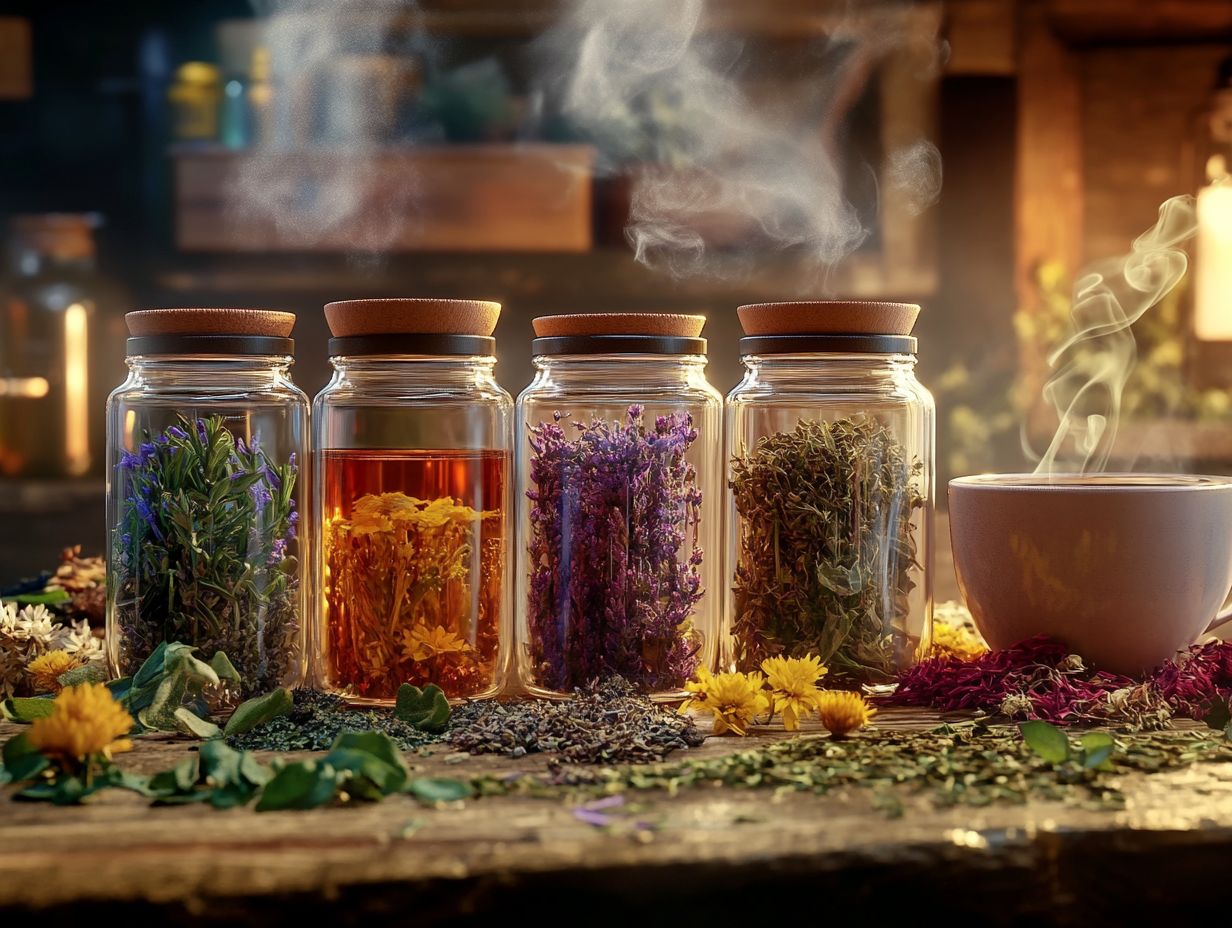
Valerian Root stands out as a sought-after herbal remedy, primarily known for its ability to enhance sleep quality. This is especially advantageous for those dealing with Seasonal Affective Disorder (SAD) and the melatonin production hiccups that often accompany the winter months.
With deep roots in traditional herbal medicine, Valerian has been cherished for centuries as a natural way to promote relaxation and alleviate anxiety. Recent clinical studies have bolstered its reputation, showing that Valerian Root can significantly improve sleep quality by reducing the time it takes to drift off and extending overall sleep duration.
Better sleep plays a vital role in easing the symptoms linked to SAD, offering individuals a more restorative and refreshing experience. By nurturing a profound sense of calm, this herbal ally is steadily earning its place in contemporary wellness practices.
What Is Seasonal Affective Disorder (SAD)?
Seasonal Affective Disorder (SAD) is a specific type of clinical depression that typically emerges in a seasonal pattern, often triggered by insufficient sunlight exposure during the winter months. This lack of light can lead to significant mood disorders, depressive symptoms, and a noticeable drop in energy levels.
This condition can profoundly affect your daily life, influencing both your physical and emotional well-being. You might find yourself feeling irritable, experiencing changes in sleep patterns, struggling to concentrate, or craving carbohydrates more than usual.
What sets SAD apart from other forms of depression is its strong connection to seasonal changes. While other types of depression can strike at any time, SAD is particularly linked to shorter days and colder weather. Research indicates that people living in areas with less winter sunlight often experience SAD more frequently.
Genetic factors may also play a role, as those with a family history of mood disorders face a higher risk. Studies suggest that nearly 5% of the U.S. population may contend with SAD, underscoring its importance in conversations about seasonal mental health.
What Are the Symptoms of SAD?
The symptoms of Seasonal Affective Disorder (SAD) can manifest as persistent low energy, shifts in sleep patterns, emotional upheaval, and an overarching sense of sadness. These feelings often go beyond simple sadness; you might grapple with irritability, heightened anxiety, and a noticeable lack of motivation for activities you once enjoyed.
Physically, changes in appetite may lead to weight gain or loss, coupled with fatigue that lingers despite getting enough rest. Cognitively, you may face challenges like difficulty concentrating or making decisions, complicating your social interactions further.
The severity of these symptoms can fluctuate, potentially leading to feelings of isolation and neglect of self-care routines as the joy of connecting with others fades. This creates a cycle that can be difficult to break.
How Can Herbal Remedies Help with SAD?
Herbal remedies can play a pivotal role in alleviating the symptoms of Seasonal Affective Disorder (SAD). They enhance your mood and provide natural alternatives to traditional depression treatments, including homeopathy for seasonal affective disorder, ultimately supporting your mental health.
Take St. John’s Wort, for instance. This herb is often celebrated for its mood-lifting potential and can be a valuable ally if you’re grappling with the winter blues.
Saffron, known for its vibrant hue and rich history in traditional medicine, has been shown to improve emotional well-being and lessen feelings of sadness.
Rhodiola Rosea also deserves mention. It is known for its adaptogenic properties that help your body manage stress and combat fatigue, often linked to SAD.
However, it s crucial to approach these herbal solutions with care. Consulting a qualified healthcare professional or a licensed nutritionist before adding them to your treatment plan is essential. This ensures that these remedies align well with your unique health needs.
What Are the Other Benefits of These Herbal Remedies?
Herbal remedies offer more than just relief from Seasonal Affective Disorder (SAD). They can enhance your emotional well-being, improve cognitive function, and serve as valuable support alongside wellness strategies, such as cognitive behavioral therapy, which helps change negative thought patterns.
These natural treatments promote relaxation and reduce stress, making them an excellent choice for anyone looking to achieve balance in life.
For example, valerian root and chamomile are popular for improving sleep quality, vital for maintaining overall mental health. Herbs like ginkgo biloba may support cognitive health, potentially enhancing both memory and focus.
Research supports that incorporating these remedies into your daily routine can foster a more holistic approach to mental wellness. They help you navigate the contemporary challenges you face.
Are There Any Side Effects of Using Herbal Remedies for SAD?
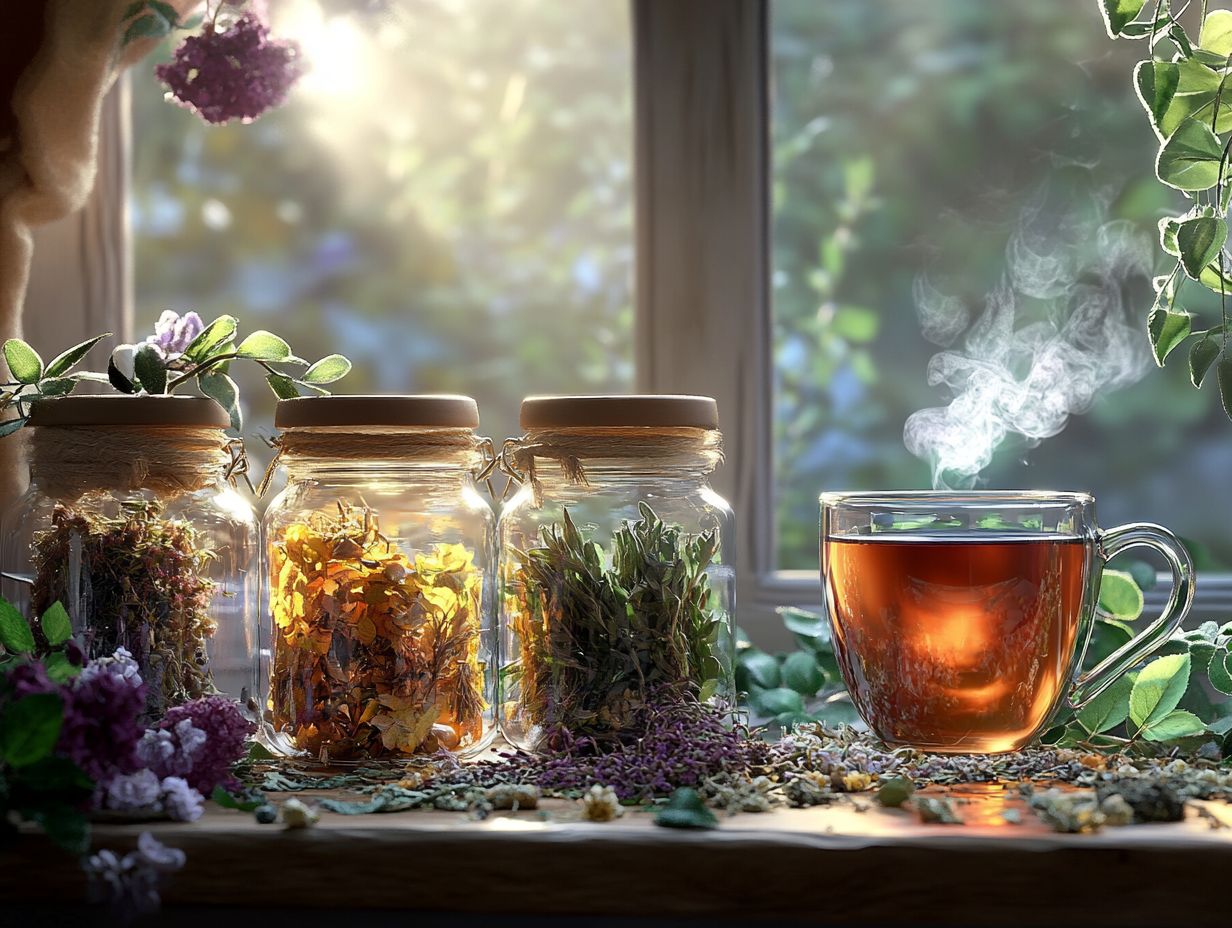
While herbal remedies can offer numerous benefits for managing Seasonal Affective Disorder (SAD), it s crucial to remain mindful of potential side effects. These effects can vary greatly depending on the individual and the specific remedy.
For example, you might encounter gastrointestinal issues, fatigue, or allergic reactions to certain herbal ingredients. What works wonders for one person could prove ineffective or even unsafe for another. This highlights the importance of seeking tailored advice from a healthcare professional.
Consider possible interactions with other medications and any pre-existing health conditions. Keeping a vigilant eye on your overall health will help you navigate your symptoms more effectively.
How Can One Incorporate These Herbal Remedies into Their Daily Routine?
Incorporating herbal remedies into your daily routine for managing Seasonal Affective Disorder (SAD) can elevate your self-care practices and provide emotional support.
To fully harness these natural solutions, consider the right dosage and timing for consumption. Starting your day with a warm cup of St. John’s Wort tea might elevate your mood and set a positive tone for the hours ahead.
Preparing herbal tinctures or capsules in advance can streamline your approach. Remember, consistency is key! Making these remedies a regular part of your routine creates an environment that encourages emotional resilience.
When you combine herbal treatments with other wellness practices like light therapy or mindfulness techniques you can amplify their effectiveness even further.
What Other Natural Methods Can Help with SAD?
Along with herbal remedies, there are various natural methods to alleviate the symptoms of Seasonal Affective Disorder (SAD). Consider light therapy, regular exercise, and maintaining adequate vitamin D levels.
Light therapy is particularly effective for those struggling with SAD. Using a light box that simulates natural sunlight can boost serotonin levels, often leading to an improved mood.
Combine this with regular physical activity for better results. Exercise not only boosts your endorphins but also encourages social interaction, further enhancing your emotional well-being.
Incorporating dietary supplements, such as omega-3 fatty acids, which are fats found in fish and some plants that are good for your brain and heart, and B vitamins can provide additional mental health support.
Simple lifestyle adjustments, like sticking to a consistent sleep schedule and spending more time outdoors during daylight hours, can play a crucial role in fostering a balanced emotional state throughout the year.
When Should One Consult a Doctor for SAD?
Consulting a doctor for Seasonal Affective Disorder (SAD) is crucial when symptoms consistently disrupt daily functioning. It’s essential to get a comprehensive psychological evaluation and a personalized treatment plan.
Timely intervention can safeguard you against the long-term repercussions of untreated mental health issues. If you find yourself dealing with persistent sadness, fatigue, or difficulty concentrating, it s time to seek professional guidance.
Don t wait! Reach out for help now to manage your symptoms effectively and explore various treatment options. Psychotherapy, especially talk therapy that helps change negative thoughts and behaviors, has proven beneficial for many individuals.
In some cases, medications such as antidepressants may be prescribed to help balance your mood, providing additional support in navigating the complexities of SAD.
Can These Herbal Remedies Be Used in Conjunction with Other Treatments for SAD?
You might wonder if herbal remedies can effectively complement treatments for Seasonal Affective Disorder (SAD), such as talk therapy and conventional medication.
Natural alternatives like St. John s Wort or omega-3 fatty acids could provide extra support in alleviating symptoms, but their compatibility with established treatments often varies from person to person.
While combining these therapies may enhance your overall well-being, it also raises potential concerns regarding interactions and side effects.
For that reason, consulting with a qualified mental health professional is essential before starting any new approach. These consultations can help you craft a personalized strategy that prioritizes both safety and effectiveness, ultimately maximizing benefits while minimizing risks.
Frequently Asked Questions
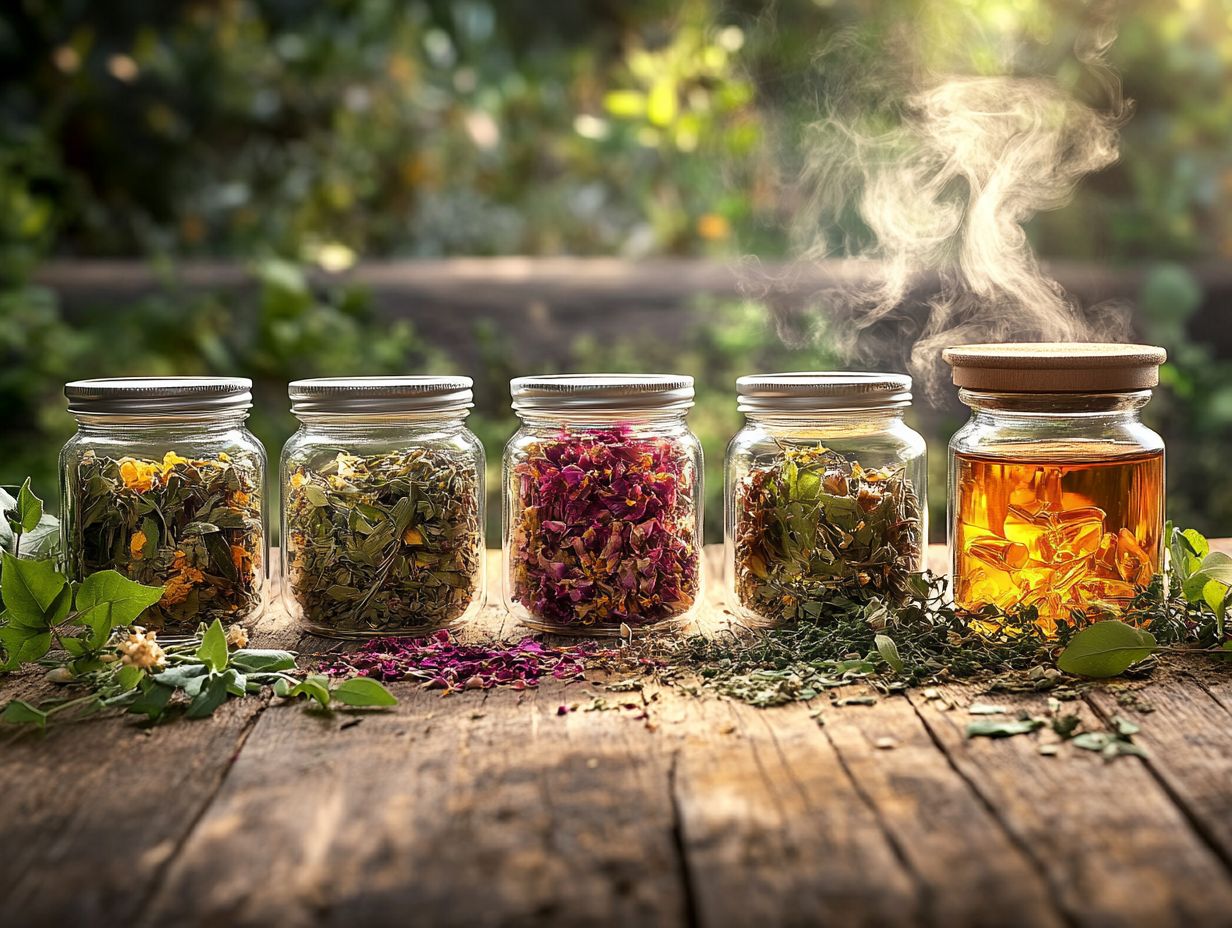
What is Seasonal Affective Disorder (SAD)?
Seasonal Affective Disorder (SAD) is a type of depression that occurs during the fall and winter months due to reduced exposure to sunlight. Common symptoms include feelings of sadness, low energy, and changes in sleep and appetite.
What are the causes of Seasonal Affective Disorder?
The exact cause of SAD is not known, but it is believed to be linked to decreased sunlight exposure, which can disrupt the body’s natural circadian rhythm and lead to changes in hormone levels and brain chemicals.
What are the 5 herbal remedies for Seasonal Affective Disorder?
The five herbal remedies for SAD are St. John’s Wort, Valerian Root, Rhodiola Rosea, Chamomile, and Saffron. These herbs, along with others, can be found in our list of 5 herbal remedies to try this winter, and have been traditionally used to improve mood, reduce anxiety, and promote relaxation.
Can herbal remedies be used as the sole treatment for Seasonal Affective Disorder?
No, herbal remedies should not be used as the sole treatment for SAD. It’s important to consult with a healthcare professional and consider a combination of treatments, including therapy, light therapy, and medication for the best results.
Are there any side effects to using herbal remedies for Seasonal Affective Disorder?
Herbal remedies are usually safe. However, it s crucial to talk to a healthcare professional about potential side effects before use.
Possible side effects include an upset stomach, dizziness, and changes in how other medicines work.
How long does it take for herbal remedies to show results for Seasonal Affective Disorder?
Results from herbal remedies can vary by person. Consistent use for at least 4-6 weeks is recommended to notice improvements in SAD symptoms.

